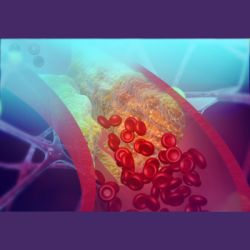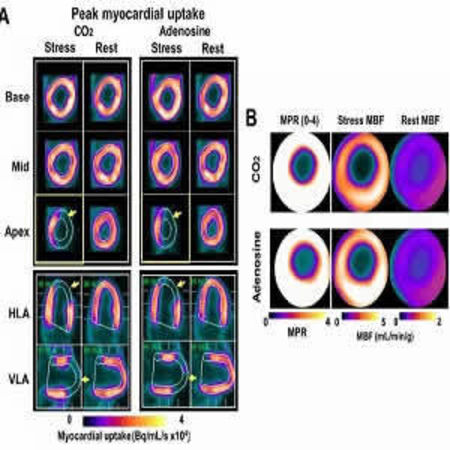According to a new study, the use of injectable forms of pharmacological stress agents such as adenosine or one of its analogues to dilate blood vessels during cardiac stress tests could have severe side effects. The findings are published in the Journal of Nuclear Medicine.
Study researchers used PET/MR imaging to demonstrate that increases in partial pressure of arterial carbondioxide (PaCO2) can achieve the same goal of widening blood vessels during stress tests but do it more efficiently and safely.
The effect of PaCO2s on myocardial blood flow has been studied in the past but to date, findings have been inconclusive because of difficulty in quickly controlling PaCO2s, to limit hypercapnia and the uncertain measures of the outcome variable.
During this study however, the researchers have tried to overcome these issues by incorporating new technology so as to be able to control arterial blood gas levels accurately, precisely and rapidly. Their findings show, for the first time, that a physiologically tolerable increase in PaCO2s can amplify myocardial blood flow more than two-fold.
Three groups of canines were included in this study. These included those without coronary stenosis, those with non-flow limiting stenosis and those with pre-administered caffeine. In all three cases, PaCO2s proved as effective as the standard dose of adenosine and was found to be better in those pre-administered with caffeine.
"This key finding opens the door to a completely new protocol for cardiac stress testing--one that has the potential to benefit numerous patients who are contraindicated for commonly used pharmacological stress agents," says Rohan Dharmakumar, PhD, of the Cedars-Sinai Medical Center and University of California, Los Angeles, California. "Since hypercapnia is safe and effective when its magnitude is tightly controlled, it could also empower repeat stress testing in target populations with heart disease--overcoming a limitation of current stress tests that rely on injectable pharmacological agents."
Source: Society of Nuclear Medicine
Image Credit: Rohan Dharmakumar. Cedars-Sinai Medical Center
References:
Yang, Hsin-Jung et al. (2017) Arterial CO2 as a Potent Coronary Vasodilator: A Preclinical PET/MR Validation Study with Implications for Cardiac Stress Testing. The Journal of Nuclear Medicine. doi: 10.2967/jnumed.116.185991
Latest Articles
PET/MR, Arterial CO2, Potent Vasodilator, adenosine, PaCO2
According to a new study, injectable forms of pharmacological stress agents such as adenosine or one of its analogues to dilate blood vessels during cardiac stress tests could have severe side effects. The findings are published in the Journal of Nuclear
























